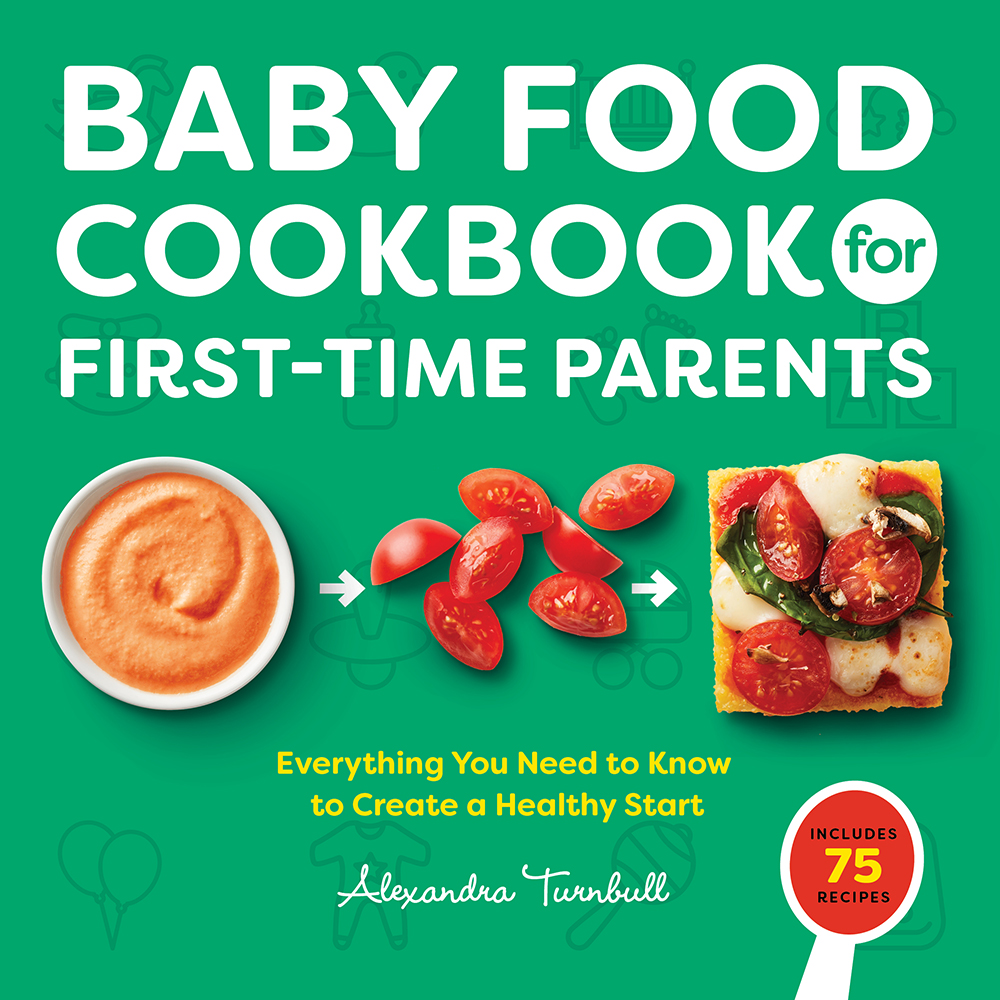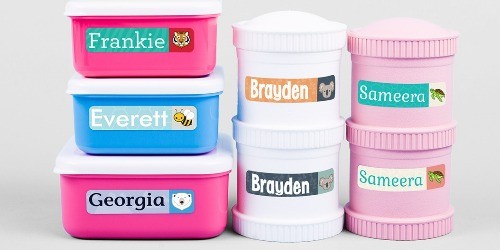This post may contain affiliate links. Read our disclosure here. This article is for informational and educational purposes only and is not/should not be used for medical advice. If you’re concerned about your child’s growth and development, always speak with your child’s health care team.
Protein powders and shakes can be a convenient way to supplement a child’s diet, especially when dealing with picky eaters or children with limited food variety. But are they safe for kids, and which ones are the best? Let’s explore the key factors to consider, along with some recommended options.
Table of Contents
Are Protein Powders for Kids Safe?
In general, protein powders and shakes can be safe for children, but there are important considerations:
1. Protein Needs by Age:
- Toddlers (1-3 years): ~13 grams/day
- Preschoolers (4-8 years): ~19 grams/day
- Older children (9-13 years): ~34 grams/day
2. Prioritize Dietary Protein:
Most children meet their protein needs through regular meals. If children are short on protein in their diet, efforts should be made to prioritize more protein through food first, rather than supplements. For more protein sources for kids, read more here.
Extra protein from powders and shakes may be necessary for selective eaters, active kids, or those with medical conditions that impact appetite or nutrient absorption. Always consult with your child’s healthcare team before implementing any supplement.
3. Overconsumption Risks:
High protein intake can strain the kidneys and interfere with calcium absorption, which is crucial for bone health. It’s important to avoid excessive protein unless advised by a healthcare professional.
It’s also possible for a child to consume excess calories with supplements, leading to unnecessary weight gain.
4. Check for Additives and Sugar:
Many commercial protein powders for kids, including shakes, are marketed for adults and contain far too much protein for kids. They may also contain artificial sweeteners, caffeine, or added sugars that aren’t suitable for kids, especially as a daily supplement.
It’s difficult to find a protein supplement for children with minimal ingredients, simply because these products are meant to fill many different nutrient gaps.
5. Supplements are Not Regulated
Supplements are not regulated by the FDA, therefore it’s hard to know exactly what you’re getting. Look for products that have been third-party tested.
When Should Kids Use Protein Shakes?
Protein shakes are ideal:
- If picky eating limits protein-rich foods (like meat, eggs, beans, dairy).
- After illness or surgery, when appetite may be decreased.
- As a supplement for very active children with increased nutritional needs.
- if a child has a medical condition that impacts appetite and nutrient absorption.
Key Features to Look For in Protein Powders for Kids
- Moderate Protein Levels: Around 5-15 grams per serving is usually sufficient for children.
- Protein source: Opt for plant-based or whey protein with minimal processing.
- Fortified with vitamins/minerals: Some shakes include calcium, iron, or vitamin D.
- Natural Ingredients: Minimal additives and no artificial sweeteners or stimulants (caffeine).
- Low in Sugar: Aim for less than 10 grams of added sugar per serving – the lower the better.
- Allergen-Friendly Options: If your child has food allergies, be on the look out for safe options.
- Flavor and palatability: at the end of the day, it should be something your child enjoys or tolerates.
Top Protein Powders and Shakes for Kids
Orgain Organic Kids Protein Shake
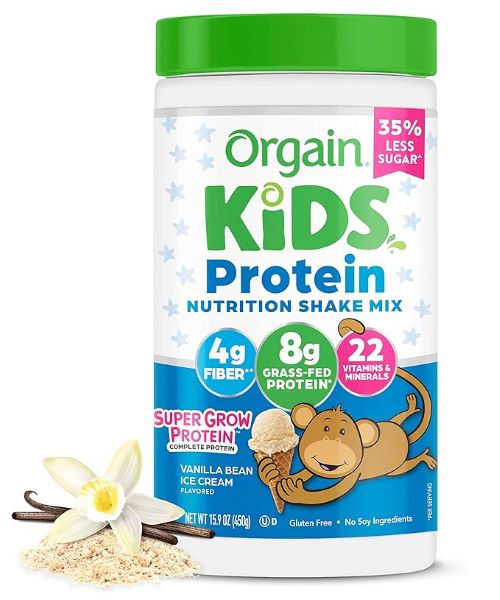
- Why it’s great: contains 4 grams of protein, 8 grams of grass-fed protein, 22 vitamins and minerals, and 35% less sugar than leading kids nutrition shake.
- Protein per serving: 8 grams
- Bonus: Certified organic and free of artificial sweeteners. Comes in powder and individual liquid forms.
- Downside: Lower in iron and choline than others
Ripple Kids Shake Ups
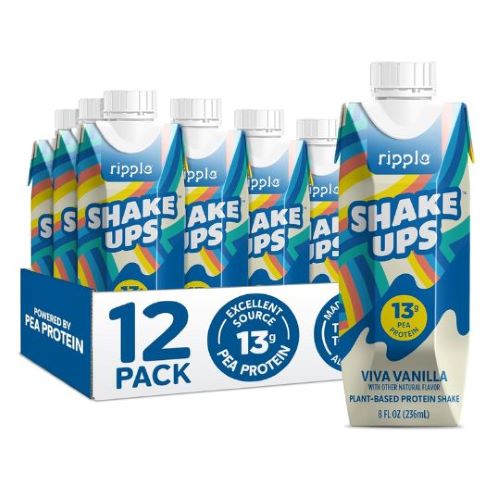
- Why it’s great: Pea protein-based and dairy-free, ideal for kids with lactose intolerance or milk allergies.
- Protein per serving: 13 grams
- Bonus: Made without the top 9 allergens and an excellent source of calcium and vitamin D. Also a non-dairy milk version with 8 grams of pea protein.
- Downside: Higher in sodium (190mg)
Healthy Height Grow Daily
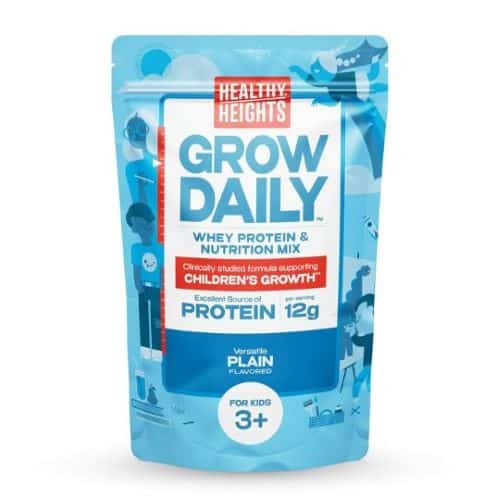
- Why it’s great: Protein powder that also provides a good source of calcium, iron, vitamin c, and zinc.
- Protein per serving: 12 grams
- Bonus: Comes in a plain version that allows you to mix it into a wide variety of foods and beverages. Also comes in chocolate and vanilla.
- Downside: Lower in additional vitamins and minerals as other protein supplements for children.
Kids Daily Essentials
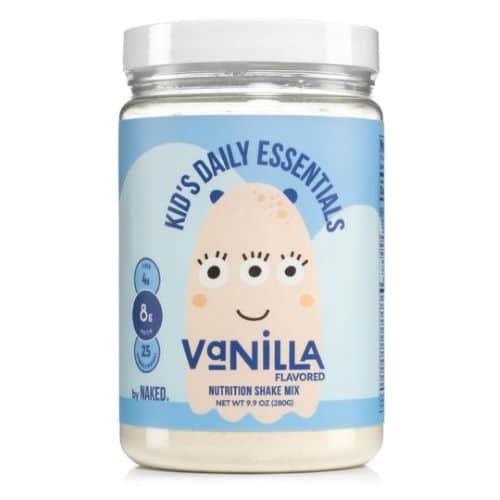
- Why it’s great: Protein powder made with organic milk and no artificial sweeteners, flavors, colors, or preservatives.
- Protein per serving: 8 grams
- Bonus: Provides 9 mg of iron per serving and is a great option for kids who don’t eat iron-rich foods. Also uses milk protein isolate versus a whey protein. Learn more about milk protein isolate here.
- Downside: Doesn’t come in a convenient premade version.
Nurished Mighty Milk
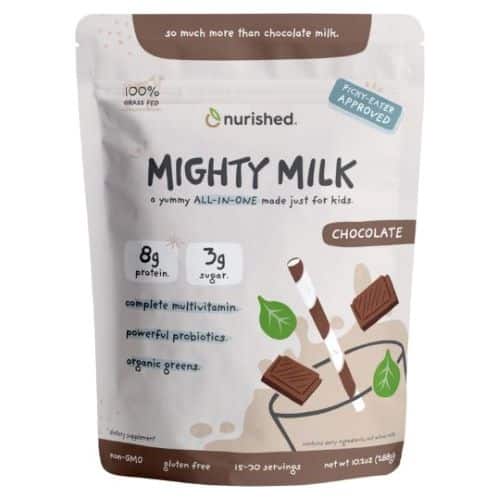
- Why it’s great: All-in-one beverage with protein, organic greens, 2 billion probiotics, and a complete multivitamin.
- Protein per serving: 8 grams
- Bonus: Third-party lab tested with no artificial colors, flavors, or sweeteners.
- Downside: Only 60 calories for two scoops if using for children who need more calories.
Tips for Introducing Protein Shakes to Picky Eaters
- Start small: Offer small amounts mixed with milk or blended into smoothies.
- Make it fun: Use colorful cups or straws to engage your child.
- Pair with favorite foods: Serve alongside snacks they already enjoy.
- Involve them in the process: Let your child help pick flavors or add fruits to homemade shakes.
Homemade Protein Shakes: A Safe Option
For full control over ingredients, consider making shakes at home using:
- Greek yogurt or milk (dairy or plant-based)
- Peanut butter, almond butter, or seed butters
- Fruits like bananas, berries, or mango
- Oats, ground walnuts, chia seeds, or flaxseeds
- A splash of honey or maple syrup for sweetness
Recipe Idea:
- 1 cup of milk (or milk alternative) – 8 g protein
- ½ banana – 0.5 g protein
- 2 tablespoons peanut butter – 6 g protein
- 2 tablespoons Greek yogurt ~2 g protein
- 1 teaspoon honey (for kids over 1 year old)
- Total protein ~ 16.5 g protein
Blend and serve chilled for a nutritious, kid-friendly treat!
Conclusion
Protein shakes can be a helpful tool for parents dealing with picky eaters or children with increased nutritional needs. However, they should not replace whole foods, nor are they always necessary. Parents and caregivers should prioritize food first as a source of protein.
When choosing a protein shake for your child, look for age-appropriate options with simple, natural ingredients. As always, consult with a pediatrician or dietitian if you have concerns about your child’s diet or protein intake.
With the right approach, protein shakes can fit seamlessly into a child’s diet, providing the nutrients they need to grow, thrive, and enjoy their meals!


